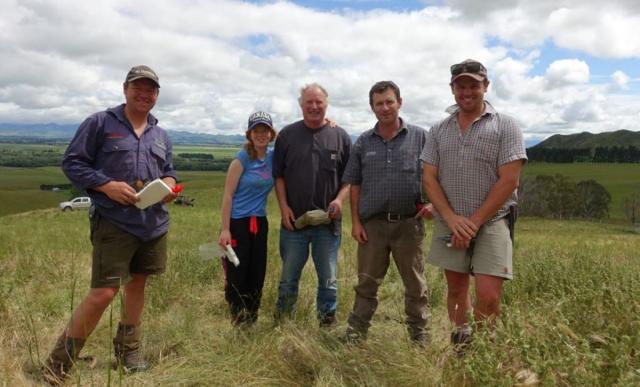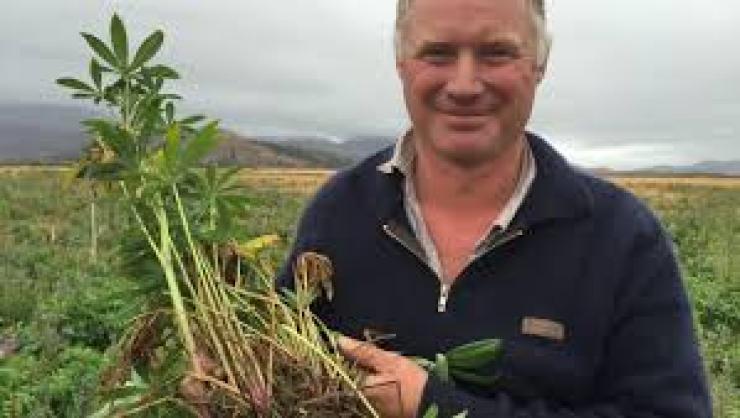Beef + Lamb New Zealand (B+LNZ) spoke to Central South Island Farmer Councillor Gavin “Snow” Loxton about his experience on the B+LNZ Farmer Council and the benefits it offers.

Snow says farming is a constant balance of innovation and sustainability. “We’re proud to be contributing to both through our work at Sawdon Station,” he says.
Below, Snow shares how his involvement in the B+LNZ Farmer Council has supported his work in sustainable farming, weed biocontrol, and staff development at Sawdon Station.
Can you tell us a bit about Sawdon Station?
Sawdon Station is at the top end of the Mackenzie Basin near Lake Tekapō. It is the geographic centre of the South Island, sitting at an altitude of 750 meters.
We run merino ewes and wethers, producing wool contracted to Devold of Norway for apparel wear. Our farm is focused on growing high-protein legumes such as lucerne, perennial lupins, and clover to meet wool contract requirements. When feed supply exceeds demand, we also trade cattle.
Being situated where we are, our winter feeding programme is extremely important.
Why did you join the B+LNZ Farmer Council?
The local Extension Manager (Minna Wilson) approached me, and it felt like a really good fit, especially with our work on weed biocontrol.
Stable funding is crucial for long-term biocontrol programmes, and the B+LNZ Farmer Council provides a platform to advocate for regional council rates and levies to support these efforts.
What do you enjoy most about being on the B+LNZ Farmer Council?
I really enjoy having a platform to share ideas and processes that benefit the wider agriculture industry. With the new delivery programme focusing on smaller farmer discussion groups, we’re making strides in delivering both economic and environmental gains.
I’ve also benefited from being part of the council by hearing about others’ challenges and the innovative approaches they’re taking, gaining valuable opinions from industry peers, and broadening my understanding of the sector. It truly is a fantastic network to tap into!
What would you say to others thinking of joining the B+LNZ Farmer Council?
Have a go! The council needs diverse members to be successful. We’ve got a great group of farmers with different interests, which ensures fair representation and better advocacy. If you want to have a say in B+LNZ’s decisions, this is the best way. The time commitment is manageable if it aligns with your existing interests like it has with mine.
What are you doing in terms of staff development?
I am quite passionate about staff development and ensuring my team has the tools they need to succeed and grow their careers. I encourage my team to engage in off-farm activities like attending B+LNZ events, using resources etc.
In the future, I’d like to see an international visa exchange programme for farm workers, potentially coordinated through B+LNZ and/or partners. I see huge value in young people travelling and working on farms overseas and I’ll be advocating for something like this through the B+LNZ Farmer Council.
You’re recognised by Landcare Research for being an authority on biocontrols. Can you tell us more about your work with them?
I’ve been involved in the biocontrol programme for horehound since it began in 2015. Horehound is a significant issue for sheep and beef farms. The Australians had success with Horehound biocontrol agents 25 years ago, and we’re now breeding a population here with Landcare Research for nationwide distribution.
What’s the story with your work on lupins?
We’ve built on the research of Dr David Scott from the 1990s. In 2003, we planted our first commercial lot for grazing, which proved successful. We’ve since worked with Lincoln University to compare grazing lupins with lucerne, resulting in a paper published by the New Zealand Grassland Association in 2014. Over time, we’ve refined systems to incorporate lupins into our pastures.
Anyone you’d like to acknowledge?
Ronny Groenteman, the late Dr David Scott, Derrick Moot, and Katie Schins have all been instrumental in our work.
About B+LNZ’s Farmer Council
B+LNZ Farmer Councils provide a pathway for farmers to lead, support and engage with B+LNZ’s regional extension by setting regional priorities, helping with identifying critical topics and supporting the extension team to develop and deliver events and activities that farmers want and that will make an impact in their farming business.
Learn more about the B+LNZ Farmer Council and your local Regional Delivery Plan here.

B+LNZ Central South Island Farmer Councillor Gavin 'Snow'